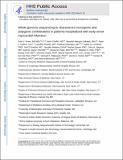Whole-genome sequencing to characterize monogenic and polygenic contributions in patients hospitalized with early-onset myocardial infarction
Author(s)
Khera, Amit V.; Chaffin, Mark; Zekavat, Seyedeh Maryam; Roselli, Carolina; Natarajan, Pradeep; Kathiresan, Sekar; ... Show more Show less
DownloadAccepted version (852.9Kb)
Publisher Policy
Publisher Policy
Article is made available in accordance with the publisher's policy and may be subject to US copyright law. Please refer to the publisher's site for terms of use.
Terms of use
Metadata
Show full item recordAbstract
Background: The relative prevalence and clinical importance of monogenic mutations related to familial hypercholesterolemia and of high polygenic score (cumulative impact of many common variants) pathways for early-onset myocardial infarction remain uncertain. Whole-genome sequencing enables simultaneous ascertainment of both monogenic mutations and polygenic score for each individual. Methods: We performed deep-coverage whole-genome sequencing of 2081 patients from 4 racial subgroups hospitalized in the United States with early-onset myocardial infarction (age ≤55 years) recruited with a 2:1 female-to-male enrollment design. We compared these genomes with those of 3761 population-based control subjects. We first identified individuals with a rare, monogenic mutation related to familial hypercholesterolemia. Second, we calculated a recently developed polygenic score of 6.6 million common DNA variants to quantify the cumulative susceptibility conferred by common variants. We defined high polygenic score as the top 5% of the control distribution because this cutoff has previously been shown to confer similar risk to that of familial hypercholesterolemia mutations. Results: The mean age of the 2081 patients presenting with early-onset myocardial infarction was 48 years, and 66% were female. A familial hypercholesterolemia mutation was present in 36 of these patients (1.7%) and was associated with a 3.8-fold (95% CI, 2.1-6.8; P<0.001) increased odds of myocardial infarction. Of the patients with early-onset myocardial infarction, 359 (17.3%) carried a high polygenic score, associated with a 3.7-fold (95% CI, 3.1-4.6; P<0.001) increased odds. Mean estimated untreated low-density lipoprotein cholesterol was 206 mg/dL in those with a familial hypercholesterolemia mutation, 132 mg/dL in those with high polygenic score, and 122 mg/dL in those in the remainder of the population. Although associated with increased risk in all racial groups, high polygenic score demonstrated the strongest association in white participants (P for heterogeneity=0.008). Conclusions: Both familial hypercholesterolemia mutations and high polygenic score are associated with a >3-fold increased odds of early-onset myocardial infarction. However, high polygenic score has a 10-fold higher prevalence among patients presents with early-onset myocardial infarction. Clinical Trial Registration: URL: https://www.clinicaltrials.gov. Unique identifier: NCT00597922. ©2019
Date issued
2019-03Department
Broad Institute of MIT and HarvardJournal
Circulation
Publisher
Ovid Technologies (Wolters Kluwer Health)
Citation
Khera, Amit V., et al., "Whole-genome sequencing to characterize monogenic and polygenic contributions in patients hospitalized with early-onset myocardial infarction." Circulation 139, 13 (March 2019): p. 1593-1602 doi 10.1161/CIRCULATIONAHA.118.035658 ©2019 Author(s)
Version: Author's final manuscript
ISSN
0009-7322